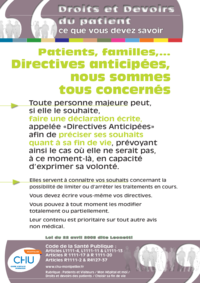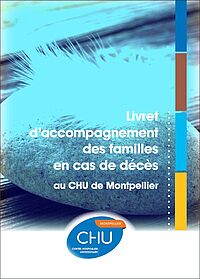In the care unit
Doctor
He certifies the death and draws up the death certificate and the accompanying documents. You can ask to meet your loved one's referring doctor, including away from hospitalization.
The care team
- Listens to you and informs you.
- Performs first aid grooming.
- Can carry out, if you wish, the toilet and the dressing of your loved one with the clothes that you have chosen and brought.
- These last treatments can also be carried out later by the funeral operator.
- Depending on your religious practice, the ritual toilet will be performed by authorized persons.
- Request, if you wish, a representative of the cult of your choice.
- Gives you the personal effects of the deceased with the exception of valuables (jewellery, keys, identity papers, cash, means of payment) which are deposited at the Treasury of the Establishment (see below the paragraph "Property belonging to the deceased").
- Collects your choice as to the care of the deceased (in accordance with the medical requirements):
- Hospital mortuary chamber.
- Funeral chamber of your choice.
- Residence.
- Asks you to fill in the first administrative forms
- Provides you with useful information documents
You can gather with your loved one in the room until they leave the unit. Your deceased will then be transported to the chosen pick-up location.
The organization of the funeral
Whatever your choice, you must contact a funeral operator (funeral company) for the organization of the funeral. These must be organized within 6 days of the death. You are free to choose the funeral operator. Hospital staff should in no way guide this choice.
The funeral operator you have chosen will carry out all or part of the procedures for you. He must be provided with a power of attorney signed by the family to withdraw the medical death certificates, in order to carry out the administrative procedures. He will fix with you the place, date and time of burial or cremation as well as the choice of the coffin and the funeral rites.
The cost of the funeral is assumed by the family but, in the event of financial difficulties, aid exists. The CHU social workers can provide you with information.
In order to help you, the care unit and the mortuary have the prefectural list of approved funeral operators and funeral homes. A copy of this list will be given to you at your request.
In the hospital mortuary
If you choose, or according to certain medical requirements, the body of the deceased is deposited in the mortuary of the establishment, within 10 hours following the death (Art. R-361-37 of the Code of Commons). If you do not want transport to your home or to a funeral home, the deceased remains there until they leave for their burial place.
The first 3 days in the mortuary are not charged. Deposit fees are charged from the 4th day. At your request, you can gather with the deceased in a room specially equipped for this purpose, every day without an appointment, from 8 a.m. to 6 p.m., except Saturdays, Sundays and public holidays from 8:30 a.m. to 12:30 p.m.
After placing in the coffin and closing the coffin, the body of the deceased will be transported to its place of burial or cremation. The funeral will take place in agreement between the funeral home and the funeral operator, taking into account the organizational constraints of the funeral procession.
If on the death certificate there is a medico-legal obstacle, the judicial authority is requisitioned. The body of the deceased may not be visible and will only be returned to you after approval by the Public Prosecutor's Office. To obtain information, you must contact the law enforcement authorities concerned. The mortuary team is at your disposal to assist you as best as possible.
Hospital staff are required to refuse families any remuneration related to the performance of their service.
Corpse transportation
The body of your deceased is taken care of by the funeral operator and transported to the place you have chosen. The funeral operator takes care of the specific administrative formalities.
There are two types of body transport: before coffining and after coffining.
Transport before coffining
- It must be carried out within a maximum period of 48 hours from the death with or without conservation care, within the limits of French territory.
- If the transport takes place in the municipality of Montpellier, it is authorized by the Director of the hospital and the Mayor.
- If the transport takes place to another municipality, the transport authorization is sent without delay to the Mayor of the municipality of destination.
Transport after coffining and closing of the coffin
- If the transport takes place in the municipality of Montpellier, it is authorized by the Mayor.
- If the transport takes place to a municipality other than that of death, the transport authorization is sent without delay to the Mayor of the municipality of destination.
- in your presence when the coffin is closed, the seals are placed by the funeral director.
- in your absence, the sealing is carried out by a representative of the State.
- If the transport is destined for a foreign country, the authorization is given by the Prefect. The formalities required locally are to be requested from the Consulate of the destination country.
In the event of cremation, the sealing is carried out by a representative of the State at the request of the funeral operator. (Law n° 2015-177 of February 16, 2015). You can obtain more information on transport from the care team of the mortuary or from the Civil Status Department of the Town Hall.
In a funeral home or at home
The presentation of the body of the deceased
If your deceased is buried in a funeral home, you can visit him as many times as you wish. It is possible that the operator will offer you, if necessary, conservation care. This care is performed by an embalmer who travels to the funeral home or home, and is your responsibility.
Approaches
The funeral establishment is able to assist you with the administrative formalities related to the organization of the funeral. He helps you write the obituary that will appear in the newspaper, and to make contacts if necessary for the organization of a religious ceremony. He is at your disposal for any further information. If you want to know more, you can contact the Public Administrative Information Service from a landline on 3939 (price of a local call) Monday to Friday from 8:30 a.m. to 6:15 p.m. or log on to www.service-public.fr section "How to do if I have to deal with the death of a loved one"
Donation for transplant
Each of us is considered a donor for the transplant unless, during his lifetime, he has made his opposition known, either by registration in the national register of refusals, or to one of his relatives or by registering him on a paper. You may therefore be asked the question of donation when your loved one dies, by healthcare teams, in partnership with the Hospital Donation Coordination for the transplant. In this case, the team will make sure to give you all the useful information during an interview.
The donation for the transplant is carried out with respect for the wishes of the donor and the integrity of the body. The body of the deceased is then returned to you to conduct the funeral process. For more information, you can consult the following website : Agence de Biomédecine
Body donation to science
Body donation is a personal, voluntary process subject to certain rules.
The donation of the body to science is the responsibility of the Faculties of Medicine.
To carry out the donation process, you can contact the Faculty of Medicine of Montpellier on 04 34 43 35 72 rom 8:30 a.m. to 4:30 p.m. on working days except Wednesdays or the Grammont funeral center outside these hours: 04 67 22 83 83.
Administrative procedures at the hospital admissions office
The funeral operator has the declaration of death of the deceased drawn up by the staff of the establishment's Entrance Office. Once the declaration has been made, you can obtain extracts from the death certificates from the funeral operator or the civil status department of the town hall on presentation of the family record book.
Property belonging to the deceased
Clothing and objects of low value are given to you by the healthcare team. The goods (values and precious objects) belonging to the deceased and deposited in the safe of the Régie of the establishment, as well as the goods which he had kept with him, are placed in the custody of the manager and the principal treasurer. These goods are transmitted to the Treasury 8 days after the death. All the property of the deceased can be given to you on presentation of a certificate of inheritance issued by the town hall of your municipality or that of the deceased, or of a certificate of inheritance depending on the case. For more details, you can consult the website: https://www.service-public.fr/particuliers/vosdroits/F12697. You have one year to have these goods returned to you. At the end of this period, the unclaimed objects will be handed over to the deposit and consignment fund or to the Service des Domaines in order to be put up for sale.
Documents of the deceased to bring for administrative procedures
- Natural death certificates (provided by the funeral operator),
- Family book,
- National identity card, resident card or passport,
- The social security card (VITALE card),
- Mutual card.
Useful contact details
LAPEYRONIE HOSPITAL MORTUARY CHAMBER
Monday to Friday from 8:00 a.m. to 6:00 p.m. Saturdays, Sundays and public holidays from 8:30 a.m. to 12:30 p.m. Tel: 04 67 33 83 52 Fax: 04 67 33 83 53
191 avenue du Doyen Gaston Giraud
34295 Montpellier cedex 5
MONTPELLIER TOWN HALL CIVIL STATUS DEPARTMENT
Monday, Tuesday, Wednesday, Friday from 8:30 a.m. to 5:30 p.m.
Thursday from 10 a.m. to 7 p.m.
Telephone: 04 67 34 70 00
Fax: 04 99 06 06 79
Montpellier Town Hall - Town Hall
1 Place Georges Freche
34267 Montpellier
SOCIAL SERVICES
LAPEYRONIE HOSPITAL
Secrétariat : +334 67 33 80 22
ARNAUD DE VILLENEUVE HOSPITAL
Secrétariat : +334 67 33 58 33
ANTONIN BALMES-BELLEVUE HOSPITAL
Secrétariat : +334 67 33 63 32
SAINT ELOI HOSPITAL
Secrétariat : +334 67 33 70 08
GUI DE CHAULIAC HOSPITAL
Secrétariat : +334 67 33 71 58
LA COLOMBIERE HOSPITAL
Standard : +334 67 33 67 33
MAIN TREASURY
(Hospital Public Finance Center)
Service of deposited funds (return of the personal property of the deceased)
Monday to Friday from 8:30 a.m. to 12 p.m. and from 1 p.m. to 4 p.m.
Closed on Saturdays, Sundays and public holidays
Telephone: 04 67 33 94 48
Mail : t034022@dgfip.finances.gouv.fr
Centre André BENECH
191 avenue du Doyen Gaston GIRAUD
34295 Montpellier cedex 5
HOSPITAL ORGAN DONATION COORDINATION DEPARTMENT
GUI DE CHAULIAC HOSPITAL
Tel : 04 67 33 74 75
Fax : 04 67 33 74 85
Mail : Prelev-organes-tissus-sec@chu-montpellier.fr
80 avenue Augustin Fliche
34295 Montpellier cedex 5


